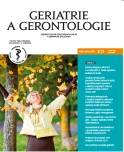-
Medical journals
- Career
Principles of Montessori approach in the care of persons with dementia
Authors: Mgr. Alžběta Bártová
Authors‘ workplace: Fakulta humanitních studií UK, Praha
Published in: Geriatrie a Gerontologie 2019, 8, č. 3: 130-133
Category: Review Article
Overview
Increasing number of persons living with dementia brings to practice many psychosocial interventions. One of such approaches is the Montessori method, originally developed for education of children, later applied by Dr Cameron Camp to support the different areas of life of people with dementia. The method is based on providing meaningful activities that are focused on the individual’s interests and the preserved abilities of people with dementia. The article describes the structure and use of the Montessori method in care of people with dementia and its evaluation.
Keywords:
dementia – Montessori
Sources
1. Mezinárodní zpráva o Alzheimerově chorobě 2018 – Současný stav výzkumu demence. Alzheimer´s Disease International, London.
2. Holmerová I. Case management v péči o lidi žijící s demencí, Praha: Fakulta humanitních studií 2018.
3. Sheppard CL, McArthur C, Hitzig SL. A systematic review of Montessori-based activities for persons with dementia. J Am Med Dir Assoc 2016; 17 (2): 117–122.
4. Douglas N, Brush J, Bourgeois M. Person-centered, skilled services using a Montessori approach for persons with dementia. Semin Speech Lang 2018; 39 (03): 223–230.
5. Camp CJ. Origins of Montessori programming for dementia. Nonpharmacol Ther Dement 2010; 1 (2): 163–174.
6. Malone ML, Camp CJ. Montessori-based dementia programming: providing tools for engagement. Dementia 2007; 6 (1): 150–157.
7. Hitzig SL, Sheppard CL. Implementing Montessori methods for dementia: a scoping review. Gerontologist 2017; 57 (5): 94–114.
8. Orsulic-Jeras S, Schneider NM, Camp CJ, et al. Montessori-based dementia activities in long-term care. Act Adapt Aging 2001; 25 (3–4): 107–120.
Labels
Geriatrics General practitioner for adults Orthopaedic prosthetics
Article was published inGeriatrics and Gerontology

2019 Issue 3-
All articles in this issue
- Editorial
- Influence of reminiscence therapy on health condition and quality of life of seniors in long-term hospital care - preliminary results
- Geriatric scales and rehabilitation after proximal femur fractures.
- Scale for measuring apathy in people in retirement homes
- Virtual reality as a way of keeping seniors activ in retirement homes.
- Economic analyses of long-term care in the Czech Republic
- Selected tools for evaluation of geriatric fragility
- Principles of Montessori approach in the care of persons with dementia
- Dopis vnoučeti jako začátek dialogu
- Potřeby starších křehkých lidí v nemocniční péči v kontextu modelu podpůrné péče – recenze publikované integrativní přehledové studie
-
Nodl M. Středověk v nás
Vydalo: Argo 2015 - Setkání českých a evropských geriatrů
- EUGMS: otevřené dveře k evropské spolupráci
- Podpetřínská tradice mladých pokračuje
- Geriatrics and Gerontology
- Journal archive
- Current issue
- Online only
- About the journal
Most read in this issue- Selected tools for evaluation of geriatric fragility
- Virtual reality as a way of keeping seniors activ in retirement homes.
- Geriatric scales and rehabilitation after proximal femur fractures.
- Influence of reminiscence therapy on health condition and quality of life of seniors in long-term hospital care - preliminary results
Login#ADS_BOTTOM_SCRIPTS#Forgotten passwordEnter the email address that you registered with. We will send you instructions on how to set a new password.
- Career

